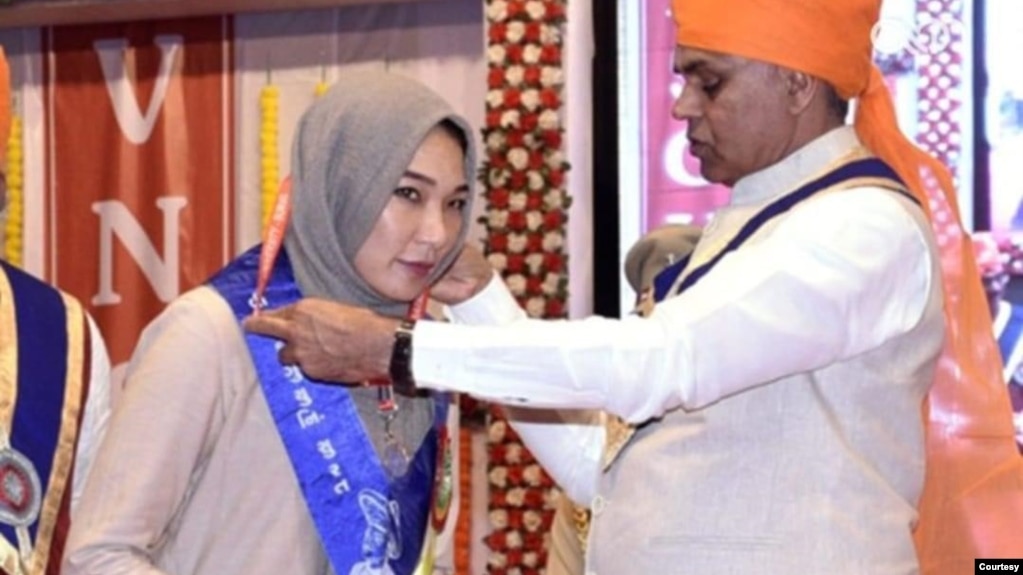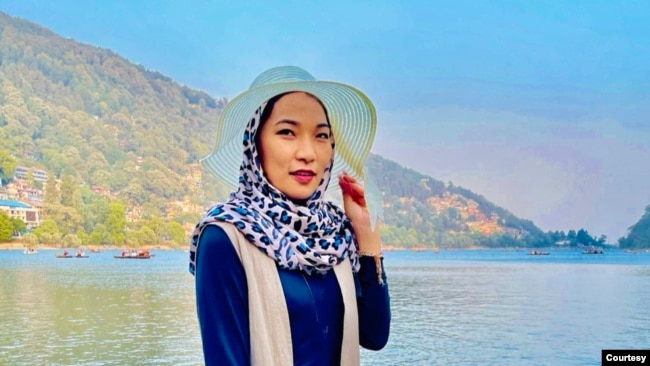March 19, 2023
Anjana Pasricha

Razia Muradi receiving a gold medal for her accomplishments in a master's course in Public Administration at Veer Narmad South Gujarat University in India.
(Photo courtesy Razia Muradi)
MUMBAI —
When Razia Muradi, a 27-year-old Afghan student, won a gold medal for her performance in a master's program in a college in India, her thoughts flashed back to her homeland, she told VOA this week.
Growing up in Bamiyan province in Afghanistan, the future looked promising. She worked by day and went to night school to complete her bachelor's degree.
“Life was peaceful and normal,” Muradi said.
“Women were free to attend university. Girls were eager to learn. Families were supportive and encouraged their daughters to pursue higher education.”
Two years ago, she came to India on a scholarship for a postgraduate course in public administration. She was among thousands of Afghans who headed to Indian colleges in the last two decades after the Taliban’s overthrow in 2001 following its first stint in power.
Like many of these young students, her goal was to return and use her degree in policymaking to take a job and help Afghanistan modernize.
All that changed abruptly when Taliban regained control of Afghanistan in August 2021. Like many women, she was gripped with dread that the country would regress into the dark days an older generation vividly remembered.
That is why it was a moment of great pride but also deep sadness when Muradi went onstage this month to accept the gold medal for achieving the highest grade-point average in her program at Veer Narmad South Gujarat University in in the western Gujarat state.
“I dedicate this achievement to all the women who do not have the opportunity that I have to study,” she told VOA. “And at some point in time, girls like me want to return this chance in some way to them. This medal is an affirmation that women can accomplish anything.”
Muradi said she sees herself as representing the women of Afghanistan deprived of education.

MUMBAI —
When Razia Muradi, a 27-year-old Afghan student, won a gold medal for her performance in a master's program in a college in India, her thoughts flashed back to her homeland, she told VOA this week.
Growing up in Bamiyan province in Afghanistan, the future looked promising. She worked by day and went to night school to complete her bachelor's degree.
“Life was peaceful and normal,” Muradi said.
“Women were free to attend university. Girls were eager to learn. Families were supportive and encouraged their daughters to pursue higher education.”
Two years ago, she came to India on a scholarship for a postgraduate course in public administration. She was among thousands of Afghans who headed to Indian colleges in the last two decades after the Taliban’s overthrow in 2001 following its first stint in power.
Like many of these young students, her goal was to return and use her degree in policymaking to take a job and help Afghanistan modernize.
All that changed abruptly when Taliban regained control of Afghanistan in August 2021. Like many women, she was gripped with dread that the country would regress into the dark days an older generation vividly remembered.
That is why it was a moment of great pride but also deep sadness when Muradi went onstage this month to accept the gold medal for achieving the highest grade-point average in her program at Veer Narmad South Gujarat University in in the western Gujarat state.
“I dedicate this achievement to all the women who do not have the opportunity that I have to study,” she told VOA. “And at some point in time, girls like me want to return this chance in some way to them. This medal is an affirmation that women can accomplish anything.”
Muradi said she sees herself as representing the women of Afghanistan deprived of education.

Razia Muradi at a summer camp in the northern Indian state of Uttarakhand.
(Photo courtesy Razia Muradi)
In December, the Taliban banned women from attending university, dealing a second blow to female education – the group had earlier barred girls from secondary schools, depriving millions from studying beyond the sixth grade.
In the year and a half since the group swept into power, women have been removed from many jobs, must wear the full veil, and are not allowed to travel without a male relative or visit parks and gyms as the hard-line Islamists roll back women's rights and freedoms.
For Afghan women like Muradi, all hopes that the Taliban would live up to their initial promises of a more liberal rule have been crushed.
“I feel broken from inside. Everything that happened in the 1990s is being repeated. The hope with which I came to India is destroyed,” Muradi said.
“I cannot see any bright future for myself. I don’t know whether I will be able to go back and meet my family. I struggle with these thoughts all the time.”
With her country in turmoil, studying for her master’s was not easy. She worried about her family, but she said she worked to stay calm as there was little she could do except honor her luck in being among the Afghan women still pursuing an education.
“I had to manage my stress. Every time I thought about Afghanistan, I told myself that it is my responsibility to take advantage of this opportunity that other girls in my country can no longer avail. So, I must focus on my studies and build my capacity if I want to bring change in the future,” she said.
Muradi is now working on her Ph.D. in public administration from the same college, supported by a scholarship from the Indian government’s Indian Council of Cultural Relations, and she has a message for the Taliban.
“I think the Taliban need to rethink about depriving women of education. If they want to rule, they cannot ignore the women. Women will protest, at some point they will stand and ask for their rights. Otherwise, half the country’s population will be useless,” she said.
In December, the Taliban banned women from attending university, dealing a second blow to female education – the group had earlier barred girls from secondary schools, depriving millions from studying beyond the sixth grade.
In the year and a half since the group swept into power, women have been removed from many jobs, must wear the full veil, and are not allowed to travel without a male relative or visit parks and gyms as the hard-line Islamists roll back women's rights and freedoms.
For Afghan women like Muradi, all hopes that the Taliban would live up to their initial promises of a more liberal rule have been crushed.
“I feel broken from inside. Everything that happened in the 1990s is being repeated. The hope with which I came to India is destroyed,” Muradi said.
“I cannot see any bright future for myself. I don’t know whether I will be able to go back and meet my family. I struggle with these thoughts all the time.”
With her country in turmoil, studying for her master’s was not easy. She worried about her family, but she said she worked to stay calm as there was little she could do except honor her luck in being among the Afghan women still pursuing an education.
“I had to manage my stress. Every time I thought about Afghanistan, I told myself that it is my responsibility to take advantage of this opportunity that other girls in my country can no longer avail. So, I must focus on my studies and build my capacity if I want to bring change in the future,” she said.
Muradi is now working on her Ph.D. in public administration from the same college, supported by a scholarship from the Indian government’s Indian Council of Cultural Relations, and she has a message for the Taliban.
“I think the Taliban need to rethink about depriving women of education. If they want to rule, they cannot ignore the women. Women will protest, at some point they will stand and ask for their rights. Otherwise, half the country’s population will be useless,” she said.
No comments:
Post a Comment